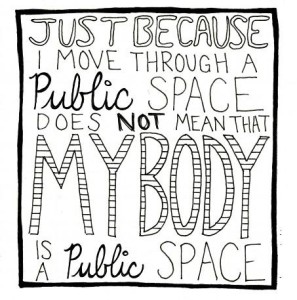 Sexual harassment on public transportation is an everyday occurrence for millions of girls and women living all over the world.
Sexual harassment on public transportation is an everyday occurrence for millions of girls and women living all over the world.
An international poll found that 32% of women in London say they have been verbally harassed on public transport; 19% were victims of direct physical abuse. In Paris, where 85% of the women polled expressed little confidence in receiving help by a member of the public if they were in trouble. In Mexico City 1 in every 10 women reported being physically assaulted on buses and trains. In India, where 5.5 million women enter the workforce each year, more than 50% express high concerns about the safety of their commute. According to Hollaback Vancouver, 58% of women surveyed indicate they don’t feel safe on transit.
Although statistics are helpful to illustrate how common sexual harassment on public transportation is for girls and women, they cannot convey the negative impacts on women’s health and well-being.
Despite the high levels of incidents, sexual harassment remains mainly unreported. Women tend not to report the majority of incidents, sometimes amid concerns that they would not be taken seriously.
So, Why We Should All Care? Some men who engage in harassing behavior might think that as long as they’re not being violent, there’s nothing wrong with their actions—or that women secretly enjoy the attention. But according to the results of an international survey released in May by Cornell University and anti–street harassment group Hollaback!, 72 percent of women who responded said they had altered their transportation plans because of harassment on buses and trains.
The survey found an overwhelming number of women experience feelings of fear, anger, and anxiety because of unwanted attention from men. Sixty percent of women in a French study reported feeling afraid of being attacked while riding a bus or train—something no one should have to deal with while trying to get to work or school.For women, the freedom to move through public space comes with limitations. Every time we go out, we have to make a set of complex calculations to avoid sexual harassment, assault, or worse.
But having to change your behaviour and daily routine through fear is not a solution.
The problem is that harassment on public transport has basically been trivialized and ignored. In Metro Vancouver reports of sexual harassment to police services have increased 28% according to Metro Vancouver Transit Police. And even with the increase reports Translink, the crown corporation responsible for public transportation has sought to downplay to the daily sexual harassment experienced by women in their transportation system.
At Battered Women’s Support Services (BWSS), we don’t believe that harassment is an unavoidable part of a woman’s daily commute. We believe that women must be able to move about and occupy the public space without being placed in danger or threatened. It’s a fundamental freedom. Safe public transit for women and girls is about recognizing our experiences and needs.
We all have the right to feel safe in our cities. Let’s make this a priority.
Read more about what you can do to help end sexual harassment on public transportation here.
On #TransitTuesday, November 10, 2015, we are bringing to light the issue of sexual violence on transit. We will be at Commercial and Broadway station in the morning handing out pamphlets with more information on how, together; we can make public transit safer for women.
The East Vancouver Cultural Centre, The Cultch is presenting the play ‘Nirbhaya’ from November 3rd to 14th. The show is being presented in partnership with Diwali Fest. “NIRBHAYA is based on the true incident of a gang rape on a bus in Delhi and how the death of this young woman affected the lives of countless individuals. BWSS will be sharing information on sexual harassment on public transit as well as what we can do as a community to prevent it.
If you are concerned about an abusive incident or relationship call our crisis line at 604-687-1867 Toll Free 1-855-687-1868
More on sexual harassment on public transit:
https://www.bwss.org/sexual-harassment-on-public-transit-is-a-problem-we-must-solve/
https://www.bwss.org/sexual-assaults-womens-safety-on-public-transportation/
https://www.bwss.org/how-can-we-improve-public-transit-safety-for-women/






